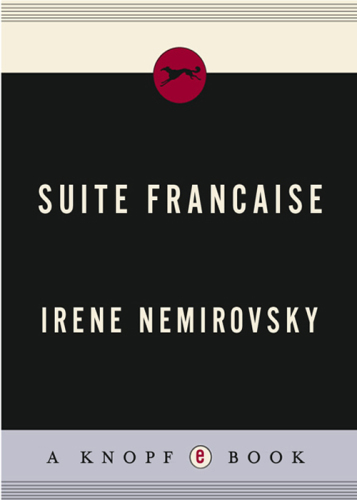
Suite Francaise
کتاب های مرتبط
- اطلاعات
- نقد و بررسی
- دیدگاه کاربران
نقد و بررسی

Starred review from March 13, 2006
Celebrated in pre-WWII France for her bestselling fiction, the Jewish Russian-born Némirovsky was shipped to Auschwitz in the summer of 1942, months after this long-lost masterwork was composed. Némirovsky, a convert to Catholicism, began a planned five-novel cycle as Nazi forces overran northern France in 1940. This gripping "suite," collecting the first two unpolished but wondrously literary sections of a work cut short, have surfaced more than six decades after her death. The first, "Storm in June," chronicles the connecting lives of a disparate clutch of Parisians, among them a snobbish author, a venal banker, a noble priest shepherding churlish orphans, a foppish aesthete and a loving lower-class couple, all fleeing city comforts for the chaotic countryside, mere hours ahead of the advancing Germans. The second, "Dolce," set in 1941 in a farming village under German occupation, tells how peasant farmers, their pretty daughters and petit bourgeois collaborationists coexisted with their Nazi rulers. In a workbook entry penned just weeks before her arrest, Némirovsky noted that her goal was to describe "daily life, the emotional life and especially the comedy it provides." This heroic work does just that, by focusing—with compassion and clarity—on individual human dramas.

Starred review from June 5, 2006
HighBridge has chosen exceptional readers for these remarkable novellas. Oreskes reads "Storm in June" in a clear, low storyteller's voice, changing tone to designate characters without trying to act out or be those characters. He handles Nemirovsky's black humor and irony with intelligence, and understates to great effect reactions from haughtiness to decency in the midst of panic and death as masses suddenly rush from Paris in the wake of Nazi bombings in 1940. Rosenblat has a husky Lauren Bacall voice that draws you into the dialectically complex relationship between French villagers and German occupiers in "Dolce." This is not a diary or a novel written years later in cool contemplation. These are historical novellas written while the author lived through the events. Yet with the detachment of hindsight and the craft of a fine, experienced author (she had successfully published nine novels), Nemirovsky shapes into novel form the stories of a small gallery of French Parisians and villagers and occupying German officers and soldiers, each with his or her national and personal idiosyncrasies and destinies. This was to have been the first of five novellas in an ongoing war saga, but in 1942 the Germans discovered the Jewish writer living in a small village. She was arrested and shipped to Auschwitz, and died a month later. Simultaneous release with the Knopf hardcover (Reviews, Mar. 13).

Starred review from June 15, 2006
Né mirovsky (1903 -42), a Sorbonne-educated Jewish é migré born into a wealthy Russian family, had planned to write a five-part novel documenting the turmoil of Nazi-occupied France. Instead, she was deported in 1942 and died in Auschwitz. Her daughters hid their mother's notebook in a valise, and it remained unread for over 60 years. This Knopf edition includes the first two books of the projected quintet, as well as appendixes with the author's notes and correspondence, and the preface to the French edition. The latter includes biographical information that tells the remarkable story of the book's provenance. Part 1, -Storm in June, - describes the panic and confusion accompanying several Parisian families' exodus to the countryside as the Germans enter Paris. The pettiness of an "arriviste" banker and his mistress contrasts sharply with his employees' acts of courage -the kind of heroism of ordinary people that history generally does not record. Part 2, -Dolce, - relates the complicated relationships between the occupying Wehrmacht army and French peasants, village merchants, and ruling class aristocracy. Some resisted, some cooperated as necessary, while others welcomed the conqueror into their arms. -Dolce - illuminates wartime economies of scarcity, the brutality of martial law (anyone caught with a radio risked immediate execution), and cultural hegemony (church bells were reset to German time). Throughout the narrative, the uncertain plight of two million French prisoners of war and painful memories of previous invasions haunt the characters. In a notebook excerpt, Né mirovsky reminds herself to -simplify - the language and the narrative. The result is a world-class -you-are-there - proto-epic that is essential for all fiction and European history collections." -Mark André Singer, Mechanics' Inst. Lib., San Francisco"
Copyright 2006 Library Journal, LLC Used with permission.

Starred review from April 1, 2006
Nemirovsky, a young Russian Jewish emigre, became a celebrated novelist in Paris at age 26 in 1929. She wrote eight more novels; then, even though she was certain that she wouldn't survive Germany's occupation of France, she embarked on a grandly symphonic, courageous, and scathing work about France's collaboration with the Nazis. She completed two of five planned movements before she was sent to Auschwitz, a heart-wrenching story meticulously documented in a supplemental section. As for Nemirovsky's masterpiece, it begins with the tumultuous "Storm in June," in which diverse Parisians frantically evacuate Paris during the June 1940 German invasion. Nemirovsky's gift for combining the panoramic with the intimate, high emotion with stinging wit, is reminiscent of Turgenev, Babel, and Berberova. Acutely sensitive to class differences, and mordantly scornful of hypocrisy, she orchestrates a veritable carnival of cowardice, lies, larceny, and murder as a panicked populace drops all pretense of civilization. The second movement, "Dolce," evokes the eye of the storm in the village of Bussy, where German officers are billeted in French homes, and life and love resume. " Suite Francaise" is a magnificent novel of the insidious devastation of occupation, and Nemirovsky is brilliant and heroic, summoning up profound empathy for all, including regretful German soldiers. Everything about this transcendent novel is miraculous.(Reprinted with permission of Booklist, copyright 2006, American Library Association.)

























دیدگاه کاربران